
Cortaderia is a genus of South American and Central American plants in the Poaceae grass family.

Strychnos is a genus of flowering plants, belonging to the family Loganiaceae. The genus includes about 100 accepted species of trees and lianas, and more than 200 that are as yet unresolved. The genus is widely distributed around the world's tropics and is noted for the presence of poisonous indole alkaloids in the roots, stems and leaves of various species. Among these alkaloids are the well-known and virulent poisons strychnine and curare.
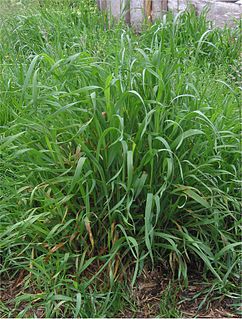
Elymus repens, commonly known as couch grass, is a very common perennial species of grass native to most of Europe, Asia, the Arctic biome, and northwest Africa. It has been brought into other mild northern climates for forage or erosion control, but is often considered a weed.
Couch grass, as a vernacular common name, may refer to:

Elytrigia is a genus of about 20–40 species of grasses, native to temperate regions of the Old World, in Europe, Asia, and northwest Africa. The species are sometimes included in the related genera Agropyron or Elymus, while species in the genera Pascopyrum and Pseudoroegneria are included in Elytrigia by some authors. The genus name has also been spelled Elytrigium.

Elymus is a genus of perennial plants with approximately 150 species in the grass family, related to rye, wheat, and other widely grown cereal grains.

Elymus canadensis, commonly known as Canada wild rye or Canadian wildrye, is a species of wild rye native to much of North America. It is most abundant in the central plains and Great Plains. It grows in a number of ecosystems, including woodlands, savannas, dunes, and prairies, sometimes in areas that have been disturbed.

Elymus elymoides is a species of wild rye known by the common name squirreltail. This grass is native to most of North America west of the Mississippi River and occurs in a number of ecosystems, from the alpine zone to desert sage scrub to valley grassland.

Elymus glaucus is a species of grass known as blue wild rye or blue wildrye. This grass is native to North America from Alaska to New York to northern Mexico. It is a common and widespread species of wild rye.

Lolium multiflorum is a ryegrass native to temperate Europe, though its precise native range is unknown.
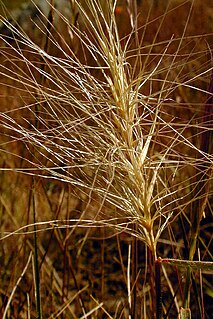
Elymus multisetus is a species of wild rye known by the common name big squirreltail.
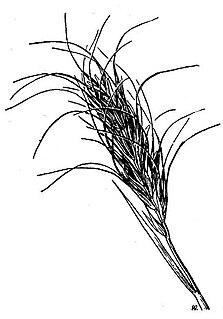
Elymus scribneri is a species of wild rye known by the common names spreading wheatgrass and Scribner's wheatgrass. It is native to much of the western United States and parts of central Canada where it grows in several types of habitat including alpine mountain peaks.

Elymus trachycaulus is a species of wild rye known by the common name slender wheatgrass. It is native to much of North America. It grows in widely varied habitats from northern Canada to Mexico, but is absent from most of the southeastern United States.

Leymus cinereus is a species of wild rye known by the common names basin wild rye, Great Basin wild rye, and Great Basin lyme grass.

Salt pannes and pools are water retaining depressions located within salt and brackish marshes. Pools tend to retain water during the summer months between high tides, whereas pannes generally do not. Salt pannes generally start when a mat of organic debris is deposited upon existing vegetation, killing it. This creates a slight depression in the surrounding vegetation which retains water for varying periods of time. Upon successive cycles of inundation and evaporation the panne develops an increased salinity greater than that of the larger body of water. This increased salinity dictates the type of flora and fauna able to grow within the panne. Salt pools are also secondary formations, though the exact mechanism(s) of formation are not well understood; some have predicted they will increase in size and abundance in the future due to rising sea levels.
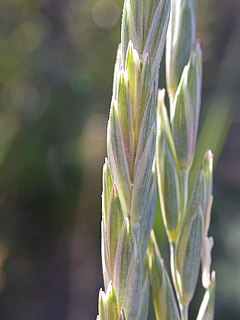
Elymus lanceolatus is a species of grass known by the common names thickspike wheatgrass and streamside wheatgrass. It is native to North America, where it is widespread and abundant in much of Canada and the western and central United States. There are two subspecies, subsp. lanceolatus occurring throughout the species' range and subsp. psammophilus occurring in the Great Lakes region.
Elymus macrourus is a species of grass known by the common names tufted wheatgrass and thickspike wildrye. It is native to northwestern North America in Alaska, Yukon, and the Northwest Territories. It is also present in eastern Siberia.

Elymus hoffmannii is a species of grass known by the common name RS wheatgrass. It was described as a new species in 1996. It became known to science when some grasses were collected in Turkey in 1979 and one type was successfully bred out, proving to be a natural hybrid. E. hoffmannii is derived from this hybrid between Elymus repens and the bluebunch wheatgrasses of Turkey, such as Pseudoroegneria spicata.
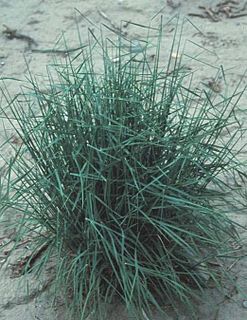
Elymus wawawaiensis is a species of grass known by the common name Snake River wheatgrass. It is native to western North America, where it occurs in the Pacific Northwest. It is native to eastern Washington and Oregon and parts of Idaho.
















